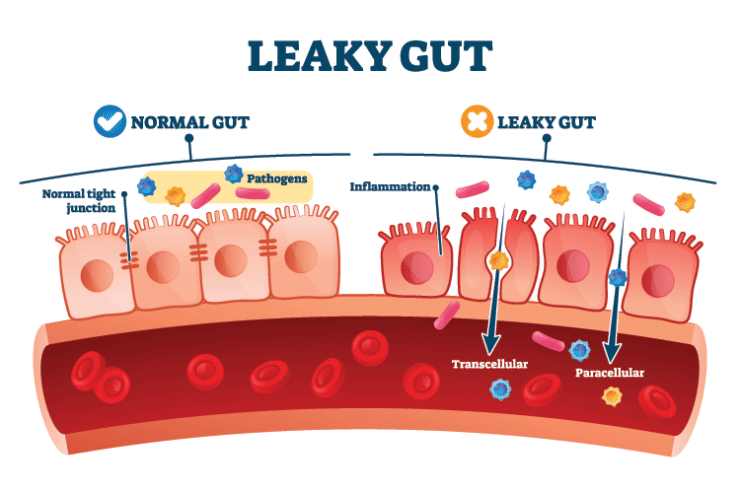Is Leaky Gut at the Root of Your Symptoms?
Normally, the cells lining your intestinal tract form a strong barrier with tight junctions between the cells.
Leaky gut means that the cells are no longer maintaining a fortified barrier. The resulting intestinal permeability allows toxins, debris and undigested food particles to cross into the blood stream, triggering leaky gut symptoms, and intestinal and systemic inflammation, and autoimmune diseases.
It is hard to imagine that many mainstream medical groups still deny its existence when we have a wealth of studies investigating intestinal permeability and identifying factors that drive this condition and linking it to a variety of diseases.
A quick search of Pubmed.gov shows 850 ‘leaky gut’ studies. If you search for the correct medical term ‘intestinal permeability’ you’ll find 19,884 studies.
That’s almost 20 THOUSAND STUDIES on leaky gut!
Hippocrates himself stated that, “All disease begins in the gut.” The term hypochondrium refers to the area between the naval and breastbone. This term was eventually rejected, as new frontiers in science emerged which identified bacteria, parasites and viruses as drivers of disease. Hypochondrium developed into the word ‘hypochondriac.’ Yet, what if those ancient ideas were true?
It turns out that they were partly true. Disease can start in other places in the body – yet, it’s widely accepted that many metabolic diseases start in the gut and leaky gut drives autoimmune conditions. It is also known that people with a range of neurological and psychiatric disorders, including depression, schizophrenia, autism, Parkinson’s disease and multiple sclerosis, have been reported to show changes in the composition of the gut microbiota relative to healthy controls, a phenomenon known as dysbiosis – which drives leaky gut.
Like this study linking schizophrenia and gut permeability, which concluded, “… patients with schizophrenia were shown to have a higher rate of abnormally increased gut permeability compared to their healthy counterparts. Moreover, there may be a correlation between gut permeability and the cognitive and cellular immunity function of the patients.”(1)
Or this study on Parkinson’s Disease (PD) Increased bowel permeability, called “leaky gut,” is typical for patients with early PD, and went on to say, “when the function of the intestinal barrier is disrupted with subsequent inflammatory processes and increased oxidative stress.”(2)
Or this study, published in Nature: Gut dysbiosis in severe mental illness and chronic fatigue: a novel trans-diagnostic construct? A systematic review and meta-analysis (3)
Animal models showed that gut dysbiosis triggers a chronic low-grade pro-inflammatory status in the host by increasing the permeability of the gut barrier (“leaky gut”) and by facilitating the translocation of bacterial antigens into the bloodstream (“endotoxemia”). In both animals and experimental models in otherwise healthy subjects, endotoxemia manifests with a range of flu-like symptoms (fatigue, anhedonia, loss of motivation), which most authors refer to as “sickness behavior”.(3)
The first step to healing the gut is to rule out leaky gut syndrome. Many practitioners and patients like to assume that they have leaky gut. Don’t guess! Run a leaky gut test.
So, is intestinal permeability causing, driving or, a result of, a specific condition? It all comes down to this – we need to test for this and we need to treat and correct this, to be able to heal or manage your health issue.
Order Your Leaky Gut Test Here
- Ishida I, Ogura J, Aizawa E, Ota M, Hidese S, Yomogida Y, Matsuo J, Yoshida S, Kunugi H. Gut permeability and its clinical relevance in schizophrenia. Neuropsychopharmacol Rep. 2022 Mar;42(1):70-76. doi: 10.1002/npr2.12227. Epub 2022 Jan 25. PMID: 35080340; PMCID: PMC8919127.
- Harsanyiova J, Buday T, Kralova Trancikova A. Parkinson’s Disease and the Gut: Future Perspectives for Early Diagnosis. Front Neurosci. 2020 Jun 17;14:626. doi: 10.3389/fnins.2020.00626. PMID: 32625058; PMCID: PMC7313629.
- Safadi, J.M., Quinton, A.M.G., Lennox, B.R. et al.Gut dysbiosis in severe mental illness and chronic fatigue: a novel trans-diagnostic construct? A systematic review and meta-analysis. Mol Psychiatry 27, 141–153 (2022). https://doi.org/10.1038/s41380-021-01032-1








